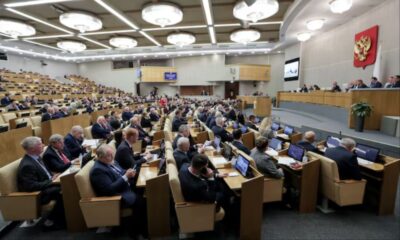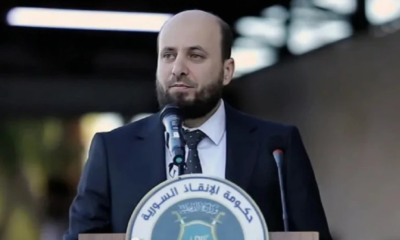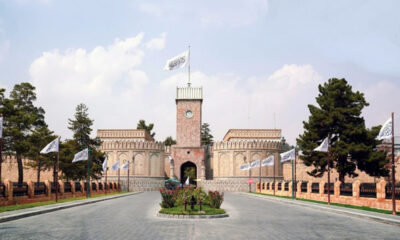Regional
Refugees return to Syria as caretaker prime minister appointed
Rebuilding Syria will be a colossal task following a civil war that killed hundreds of thousands of people
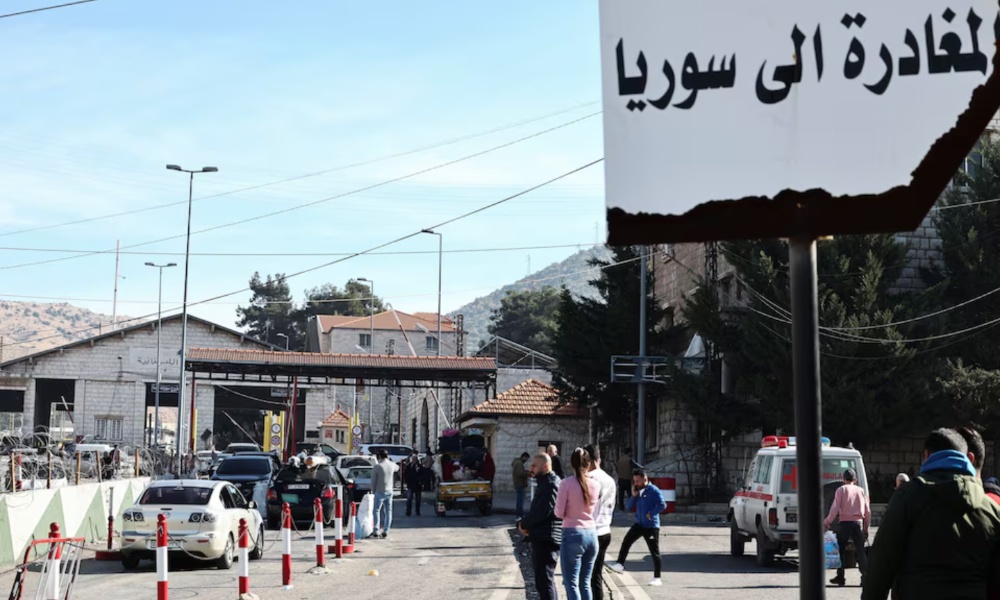
Refugees from Syria's long civil war were making their way home on Wednesday, as a new interim prime minister said he had been appointed with the backing of the rebels who toppled President Bashar al-Assad.
U.S. officials, engaging with rebels led by Hayat Tahrir al-Sham (HTS), urged them not to assume automatic leadership of the country but instead run an inclusive process to form a transitional government.
The new government must "uphold clear commitments to fully respect the rights of minorities, facilitate the flow of humanitarian assistance to all in need, prevent Syria from being used as a base for terrorism or posing a threat to its neighbours," U.S. Secretary of State Antony Blinken said in a statement.
HTS is a former al Qaeda affiliate that led the anti-Assad revolt and has lately downplayed its jihadist roots, Reuters reported.
In a brief address on state television on Tuesday, Mohammed al-Bashir, a figure little known across most of Syria, said he would lead the interim authority until March 1.
"Today we held a cabinet meeting that included a team from the Salvation Government that was working in Idlib and its vicinity, and the government of the ousted regime," he said.
Bashir ran the rebel-led Salvation Government before the 12-day lightning rebel offensive swept into Damascus.
Rebuilding Syria will be a colossal task following a civil war that killed hundreds of thousands of people. Cities have been bombed to ruins, swathes of countryside depopulated, the economy gutted by international sanctions and millions of refugees still live in camps after one of the biggest displacements of modern times.
With European countries pausing asylum applications from Syrians, some refugees from Turkey and elsewhere began making their way home.
Ala Jabeer cried as he prepared to cross from Turkey into Syria with his 10-year-old daughter on Tuesday, 13 years after the war forced him to flee his home.
He returns without his wife and three of his children who died in devastating earthquakes that struck the region last year.
"God willing, things will be better than under Assad's government. We've already seen that his oppression is over," he said.
"The most important reason for me to return is that my mother lives in Latakia. She can take care of my daughter, so I can work," Jabeer said.
In the Syrian capital Damascus, banks reopened for the first time since Assad's overthrow on Tuesday. Shops also opened again, traffic returned to the roads, cleaners were out sweeping the streets and there were fewer armed men about.
Regional
Syria’s rebels work to form government, restore order after Assad ouster
Assad’s prime minister, Mohammed Jalali, on Monday agreed to hand power to the rebel-led Salvation Government
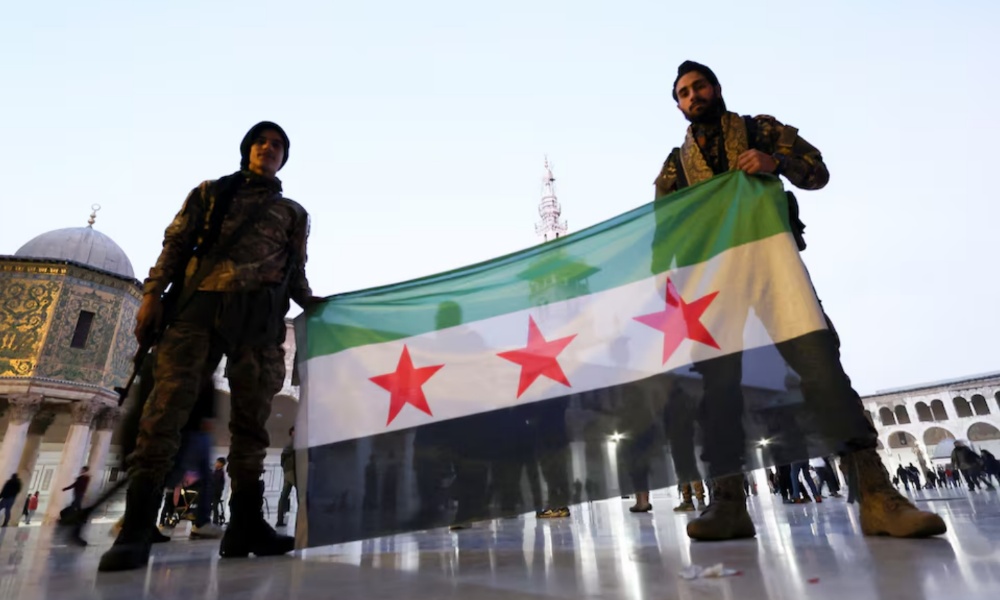
The lightning overthrow of President Bashar al-Assad left Syrians, countries in the region and world powers nervous on Tuesday about what comes next as the rebel alliance took its first steps in a government transition.
The United Nations Security Council met behind closed doors late on Monday, and diplomats said they were still in shock at how quickly Assad's overthrow unfolded over 12 days, after a 13-year civil war that was locked in stalemate for years.
"Everyone was taken by surprise, everyone, including the members of the council. So we have to wait and see and watch ... and evaluate how the situation will develop," Russian U.N. Ambassador Vassily Nebenzia told reporters after the body met.
Russia played a major role in supporting Assad's government and helping it fight the rebels. The Syrian leader fled Damascus for Moscow on Sunday, ending more than 50 years of brutal rule by his family.
With the mood in Damascus still celebratory, Assad's prime minister, Mohammed Jalali, on Monday agreed to hand power to the rebel-led Salvation Government, an administration based in rebel-held territory in northwest Syria, Reuters reported.
The main rebel commander Ahmed al-Sharaa, better known as Abu Mohammed al-Golani, met with Jalali and Vice President Faisal Mekdad to discuss the transitional government, a source familiar with the discussions told Reuters. Jalali said the handover could take days to carry out.
Al Jazeera television reported the transitional authority would be headed by Mohamed al-Bashir, who has headed the Salvation Government.
The steamroller advance of the militia alliance headed by Hayat Tahrir al-Sham (HTS), a former al-Qaeda affiliate, was a generational turning point for the Middle East.
The civil war that began in 2011 killed hundreds of thousands, caused one of the biggest refugee crises of modern times and left cities bombed to rubble, countryside depopulated and the economy hollowed out by global sanctions.
But the rebel alliance has not communicated plans for Syria's future, and there is no template for such a transition in the fractious region.
The U.S. was seeking ways to engage with Syrian rebel groups and is reaching out to partners in the region such as Turkey to start informal diplomacy, Washington said.
Qatari diplomats spoke with HTS on Monday, an official briefed on the developments told Reuters, as regional states race to open contact with the group.
Some insurgent fighters who milled about the capital on Monday, clustering in the central Umayyad Square, expressed hope a civilian administration would soon be running the country.
"We want the state and security forces to be in charge," said Firdous Omar, a fighter who intends to resume farming in provincial Idlib.
Golani has vowed to rebuild Syria, and HTS has spent years trying to soften its image to reassure foreign nations and minority groups within Syria.
But fears of reprisals remained. HTS said it will not hesitate to hold security and army officers involved in torturing the Syrian people accountable, describing them as criminals and murderers.
"We will release a list that includes the names of the most senior officials involved in the torturing of the Syrian people," Golani said in a statement. "Rewards will be offered to those who will provide information about senior army and security officers involved in war crimes."
HTS is designated as a terrorist organisation by many states and the U.N., and its governing credentials are uncertain.
Regional
Iran in ‘direct contact’ with groups in Syria’s new leadership
Assad’s fall as president removed a bastion from which Iran and Russia exercised influence across the Arab world

Iran has opened a direct line of communication with rebels in Syria's new leadership since its ally Bashar al-Assad was ousted, in an attempt to "prevent a hostile trajectory" between the countries, a senior Iranian official told Reuters on Monday.
The lightning advance of a militia alliance spearheaded by Hayat Tahrir al-Sham, a former al-Qaeda affiliate, led by Abu Mohammed al-Jawlani, marked one of the biggest turning points for the Middle East in generations.
Assad's fall as president removed a bastion from which Iran and Russia exercised influence across the Arab world.
Hours after Assad's fall, Iran said it expected relations with Damascus to continue based on the two countries' "far-sighted and wise approach" and called for the establishment of an inclusive government representing all segments of Syrian society.
There is little doubt about Tehran's concern about how the change of power in Damascus will affect Iran's influence in Syria, the lynchpin of its regional clout, Reuters reported.
But there is no panic, three Iranian officials told Reuters, as Tehran seeks diplomatic avenues to establish contact with people whom one of the officials called "those within Syria's new ruling groups whose views are closer to Iran's".
"The main concern for Iran is whether Assad's successor will push Syria away from Tehran's orbit," a second Iranian official said.
"That is a scenario Iran is keen to avoid."
A hostile post-Assad Syria would deprive Lebanese armed group Hezbollah of its only land supply route and deny Iran its main access to the Mediterranean and the "front line" with Israel.
One of the senior officials said Iran's clerical rulers, facing the loss of an important ally in Damascus and the return of Donald Trump to the White House in January, were open to engaging with Syria's new leaders.
"This engagement is key to stabilise ties and avoiding further regional tensions," the official said.
Contact with new Syrian leadership
Tehran has established contacts with two groups inside the new leadership and the level of interaction will be assessed in the coming days after a meeting at Iran's Supreme National Security Council, a top security body, the official told Reuters.
Two of the Iranian officials said Tehran was wary of Trump using Assad's removal as leverage to intensify economic and political pressure on Iran, "either to force concessions or to destabilise the Islamic Republic".
After pulling the United States out of Iran's 2015 nuclear deal with six major powers in 2018, then-president Trump pursued a "maximum pressure" policy that led to extreme economic hardship and exacerbated public discontent in Iran.
Trump is staffing his planned administration with hawks on Iran.
In 2020, Trump, as president, ordered a drone strike that killed Qassem Soleimani, Iran's most powerful military commander and mastermind of overseas attacks on U.S. interests and those of its allies.
"Iran is now only left with two options: fall back and draw a defensive line in Iraq or seek a deal with Trump," said Ali Vaez of the International Crisis Group.
The fall of Assad exposed Tehran's dwindling strategic leverage in the region, exacerbated by Israel's military offensives against Hezbollah in Lebanon and the Palestinian militant group Hamas in Gaza, Reuters reported.
Iran spent billions of dollars propping up Assad during the civil war that erupted in Syria in 2011 and deployed its Revolutionary Guards to Syria to keep its ally in power and maintain Tehran's "Axis of Resistance" to Israel and U.S. influence in the Middle East.
Assad's fall removes a critical link in Iran's regional resistance chain that served as a crucial transit route for Tehran to supply arms and fund its proxies and particularly Hezbollah.
Regional
Six soldiers, 22 militants killed in clashes in northwest Pakistan

Six Pakistani soldiers and 22 militants were killed in armed clashes in a northwestern region on Saturday, the army said, amid an increase in attacks on security forces in the area.
The firefights took place in three districts after soldiers conducted intelligence-based operations in Waziristan and its adjoining regions, the army statement said, Reuters reported.
The Pakistan Taliban, known as Tehreek-e-Taliban Pakistan (TTP), said its fighters had killed the soldiers by storming a security checkpoint. It did not say how many militants had died in the clashes.
The TTP has accelerated its attacks in recent months, mostly targeting members of the security forces.
-
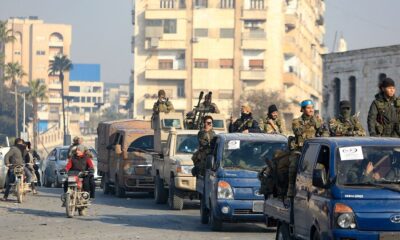
 World4 days ago
World4 days agoSyrian rebels seize fourth city, close in on Homs in threat to Assad’s rule
-

 World5 days ago
World5 days agoMuhammad was most popular boys’ baby name in England and Wales in 2023
-
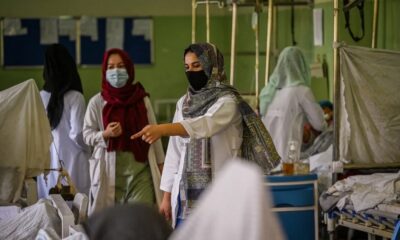
 Health4 days ago
Health4 days agoExcluding Afghan women from medical institutes threatens the future of health care in the country: MSF
-
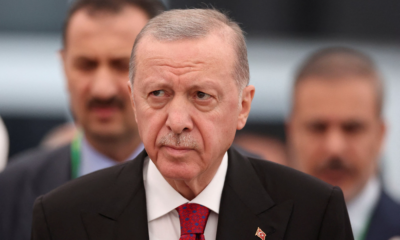
 Regional5 days ago
Regional5 days agoTurkey’s Erdogan hopes Syrian rebels will advance, but raises alarm about some fighters
-
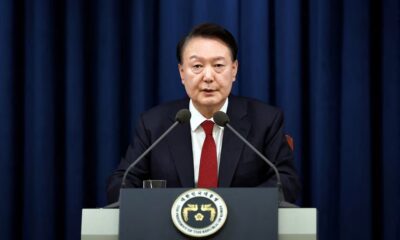
 World4 days ago
World4 days agoSouth Korea’s Yoon apologises for martial law but does not resign ahead of impeachment vote
-
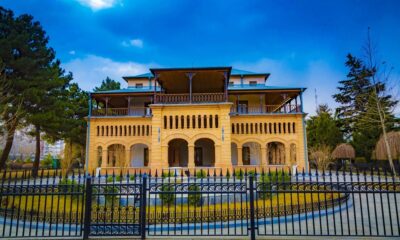
 Latest News5 days ago
Latest News5 days agoIEA ‘disappointed’ over Norway’s decision to reduce level of ties with Afghanistan
-
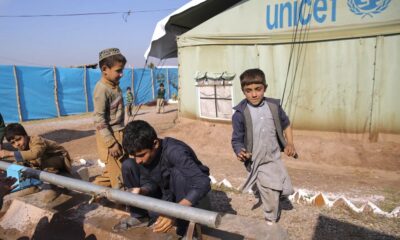
 Latest News4 days ago
Latest News4 days agoUNICEF seeks $141 million to support Afghan refugees, others in Pakistan
-

 Latest News4 days ago
Latest News4 days agoUS troops postured outside Afghanistan to counter potential threats: Biden




